|
|
|
Sort Order |
|
|
|
Items / Page
|
|
|
|
|
|
|
| Srl | Item |
| 1 |
ID:
098443
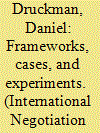

|
|
|
|
|
| Publication |
2010.
|
| Summary/Abstract |
A theory-oriented approach to teaching and training about negotiation is discussed in this article. Following the flow of a course taught on several continents, I emphasize the value of conceptualizing about the negotiating experience. This is done with concepts, metaphors, frameworks, and research findings summarized in the form of a set of narratives. A series of exercises bring the concepts to life. These include the difference between negotiating values and interests, designing scenarios, and enacting the negotiating functions of analyst, strategist, and designer. Students are also given an opportunity to perform as negotiators and observers in a complex multi-issue negotiation involving security issues similar to those discussed recently between the U.S. and Iraq. They are provided with a research experience that entails coding selected peace agreements for distributive and procedural justice as well as for the durability of those agreements. Lessons learned are generated in de-briefings of the exercises. They are also discussed in a final class where students' insights, gained from comparative case analyses, are organized by the framework introduced during earlier classes.
|
|
|
|
|
|
|
|
|
|
|
|
|
|
|
|
| 2 |
ID:
143314
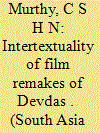

|
|
|
|
|
| Summary/Abstract |
The screen adaptation of the novella Devdas by Saratchandra Chattopadhyay is an important landmark in early Indian cinema. A prominent film, screened in four Indian languages (Bengali, Hindi, Telugu and Tamil), it seems to offer a novel vision of romantic love and romanticism. This article critiques the fanciful interpretations of the film provided by some postmodern academics in the field of comparative literature. It endeavours to place the film both as text and cinematic work into a broader perspective based on the study of intertextuality of three renditions: Raghavaiah’s Devdas (Telugu, 1953), Bimal Roy’s Devdas (Hindi, 1955) and Bhansali’s Devdas (Hindi, 2002). Grounded in cultural theory and Indian performative aesthetics coupled with moving image analysis, this study highlights the underlying, deep-rooted romanticism embedded in Indian philosophical and aesthetic traditions of devotion between atma (individual soul) and paramatma (absolute soul), personifying Paro/Chandramukhi as atma and Devdas as paramatma. This article, part of a larger project on de-Westernising media studies, makes a critical intervention in current South Asian Studies by aiming to provide a novel theoretical framework to which the philosophical and traditional tenets grounding the novella of Devdas can be anchored.
|
|
|
|
|
|
|
|
|
|
|
|
|
|
|
|
| 3 |
ID:
164023
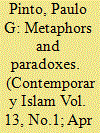

|
|
|
|
|
| Summary/Abstract |
Based fieldwork in Aleppo between 1999 and 2010, this article analyzes how secrecy and revelation, two forms of codification, maintenance and transmission of religious knowledge central to the mystical tradition of Sufism in contemporary Syria were constructed and enacted in the process of initiation (tarbiyya) into the mystical path in two Sufi zawiyas (ritual lodges) in pre-war Aleppo. Access to the unseen spheres of divine reality through initiation created both structures of charismatic power in the Sufi communities and religious subjectivities that empowered its holders as moral agents in the pre-civil war Syrian public sphere. I argue that Sufi practices of initiation that gradually revealed the divine reality to students while simultaneously also enhanced the mystery of this reality enabled Sufi practitioners to cope with the opacity of power and contradictions of everyday life of late-Ba‘thist modernity in Syria.
|
|
|
|
|
|
|
|
|
|
|
|
|
|
|
|
| 4 |
ID:
165933
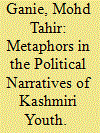

|
|
|
|
|
| Summary/Abstract |
This paper explores the role of metaphor in political discourses in Kashmir. Through a micro-study of one year—2016, which saw the eruption of a mass uprising—of what may be described as resistance literature, I demonstrate that the ‘paradise lost’ and ‘wound’ metaphors permeate Kashmiri political discourse. While the ‘paradise lost’ metaphor broadly entails a consensual interpretation, the ‘wound’ metaphor expresses Kashmiri political subjectivity in a distinctly emotional way, as this metaphor is embedded in affective cultural practices. The paper seeks to deepen the understanding of Kashmiri political narratives by examining to what effect metaphorical language operates within them, and how it allows Kashmiri youth a creative space for dissent in terms of evocatively expressing political grievances, countering statist narratives and affirming a sense of political community.
|
|
|
|
|
|
|
|
|
|
|
|
|
|
|
|
| 5 |
ID:
163751
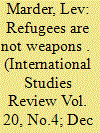

|
|
|
|
|
| Summary/Abstract |
In 2010, Kelly Greenhill published her highly acclaimed book Weapons of Mass Migration: Forced Displacement, Coercion, and Foreign Policy. In this article, I focus on the uses and implications of Greenhill's theory and specifically the metaphor Greenhill uses in place of “coercive engineered migration”—“weapons of mass migration.” The metaphor unmistakably links refugees to “weapons of mass destruction.” This should not be dismissed as just a phrase, considering that metaphors are one of the fundamental elements of thinking in international relations. Inquiring into the utility of the metaphor, I argue that associating refugees with weapons (1) weaponizes the metaphor against refugees, (2) frames the problem and possible solutions in a restrictive, securitized way that should be questioned, and (3) even undermines one of four policy options Greenhill herself proposes. After highlighting the merits of Greenhill's analysis and its embrace among far-right ideologues and conspiracy theorists, using Paul Chilton and George Lakoff's delineation of three utilities of metaphors in foreign policy, I analyze the “weapons of mass migration” metaphor. The article ends with a discussion of possible ways to mitigate the metaphor's effects and discusses alternative metaphors.
|
|
|
|
|
|
|
|
|
|
|
|
|
|
|
|
| 6 |
ID:
092486
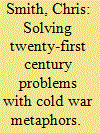

|
|
|
|
|
|
|
|